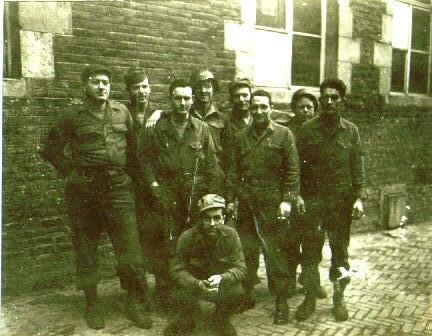Suddenly the Move
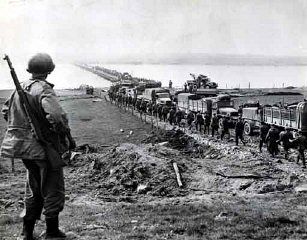
Suddenly, the 187th was ordered back to the Meuse, or Maas, the river on the Belgian-Dutch frontier for 10 days of training for the assault crossing of the Rhine. The able company moved to Roostern, Holland, while the headquarters command post was set up in an old monastery in Sittard, Holland. In parochial school buildings, Baker and Charlie companies and the medics were billeted in Maeseyck, Belgium. Baker company was now commanded by Lt. Parrish.
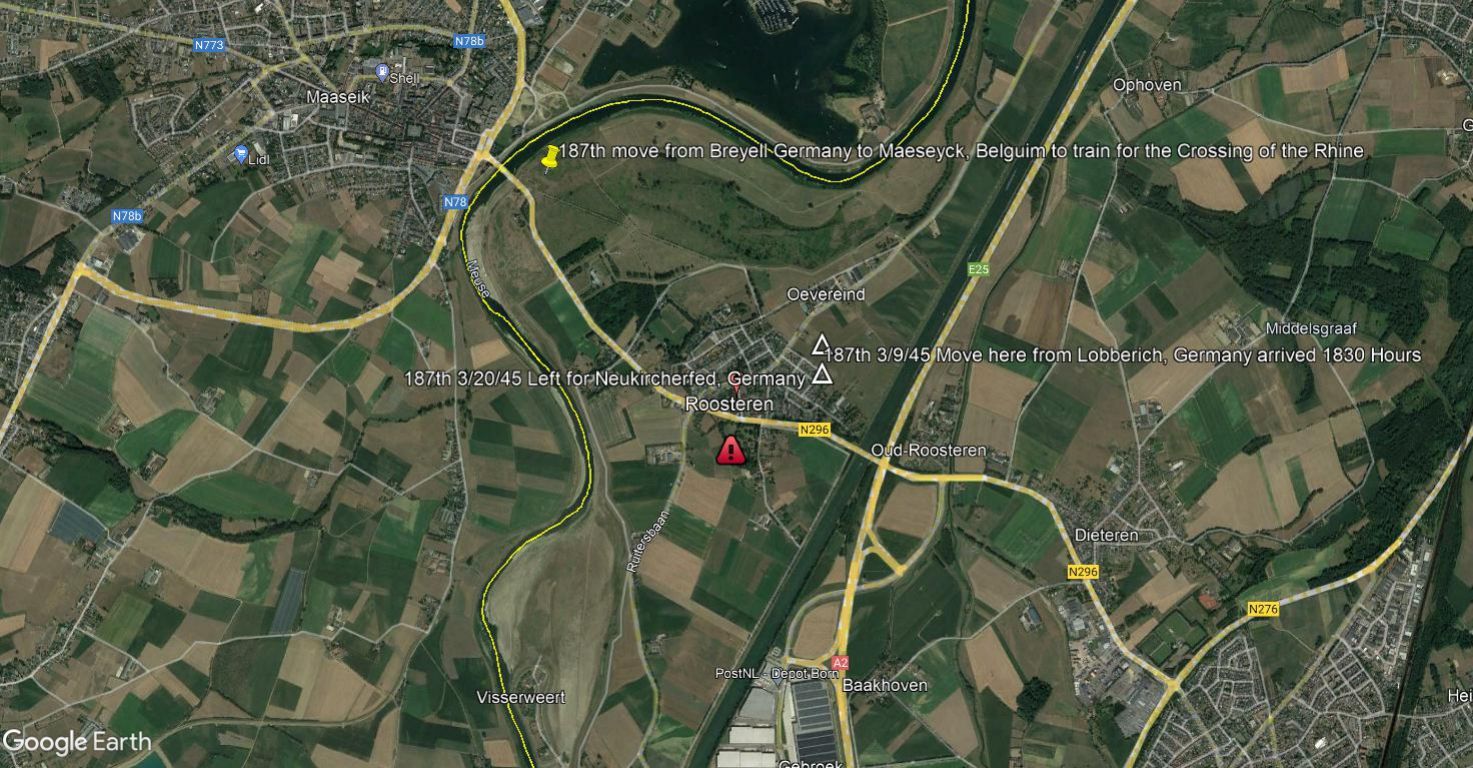
The next 10 days were busy ones. Both by day and by night, personnel of the 313th infantry Regiment, 79th Division, were ferried back and forth across the Maas river, simulating the big show to come. Although far from the fighting, troops were harassed by some V--2, "buzz bombs." There were no casualties, however.
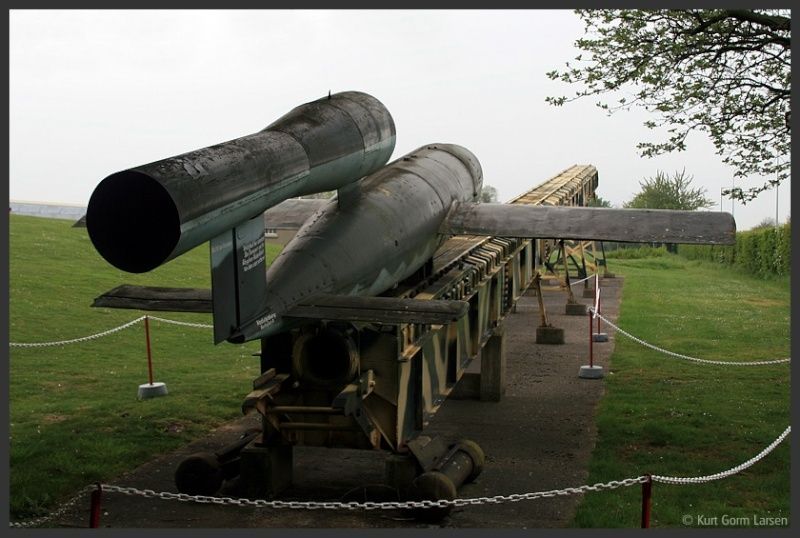
Then the secret move to Repelen, Germany to await H-hour. The line companies were billeted in Vluyn-Neukirchen, about five miles from the CP. For five days, the battalion stayed hidden, with equipment camouflaged and nobody allowed out of the billets unless necessary.
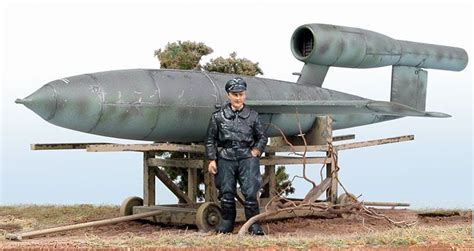

The night of March 23rd, the battalion moved up the river. Three provisional companies had been organized, an assault boat company under Capt. Witt, a ferry company commanded by LT. Parrish and a far shore road constructing company led by Capt. Tabor. At 0100 on the 24th, a British Artillery barrage in the North opened up.
Note from me. This was the largest barrage of Artillery and men of WWII. They unleashed everything but the kitchen sink on the opposite side of the Rhine River. Some engineers were positioned so close to the Rhine that the artillery's guns hit American troops, which killed some of them on their first shot to get their location and distance correct. They marched shells from the Rhine river banks inland for hours.
At 0200, the many battalions of artillery supporting the entire West Bank of the Rhine became a mass of flame as more than 1500 guns pounded enemy defenses. At 0300, the barrage lifted and the first wave of assault boats started across the treacherous thousand feet of swiftly flowing river.
Note from Me. Patton crossed the Rhine before the shelling stopped and was on his way.
German mortar and artillery fire opened up, but wave after wave of infantry got through to the opposite banks in the frail assault craft. By noon of the 24th, two regiments of the division had been ferried across the Rhine and they were striking deep into enemy defenses. The causalities had been very light, comparatively. One man was killed, one officer and three enlisted men were seriously wounded, one officer and 14 enlisted men were lightly wounded and one man was missing. All the casualties were caused by mortar or 88 MM fire.
The battalion worked around the clock for the next three days operating floating Bailey and infantry support ferries. Roads and approaches had been built earlier on both banks of the river. By the end of the second day, the entire division with more than 1600 vehicles had passed the sign on the East bank proclaiming. "You have crossed the Rhine with dry feet. Courtesy of the 187th Engineers."
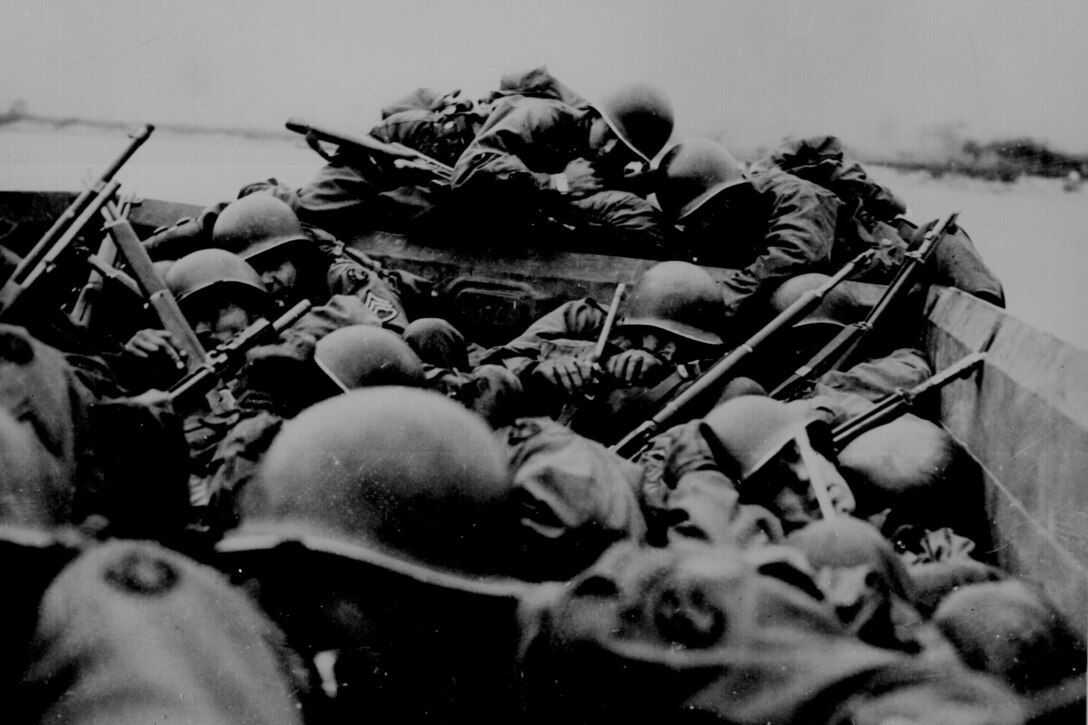
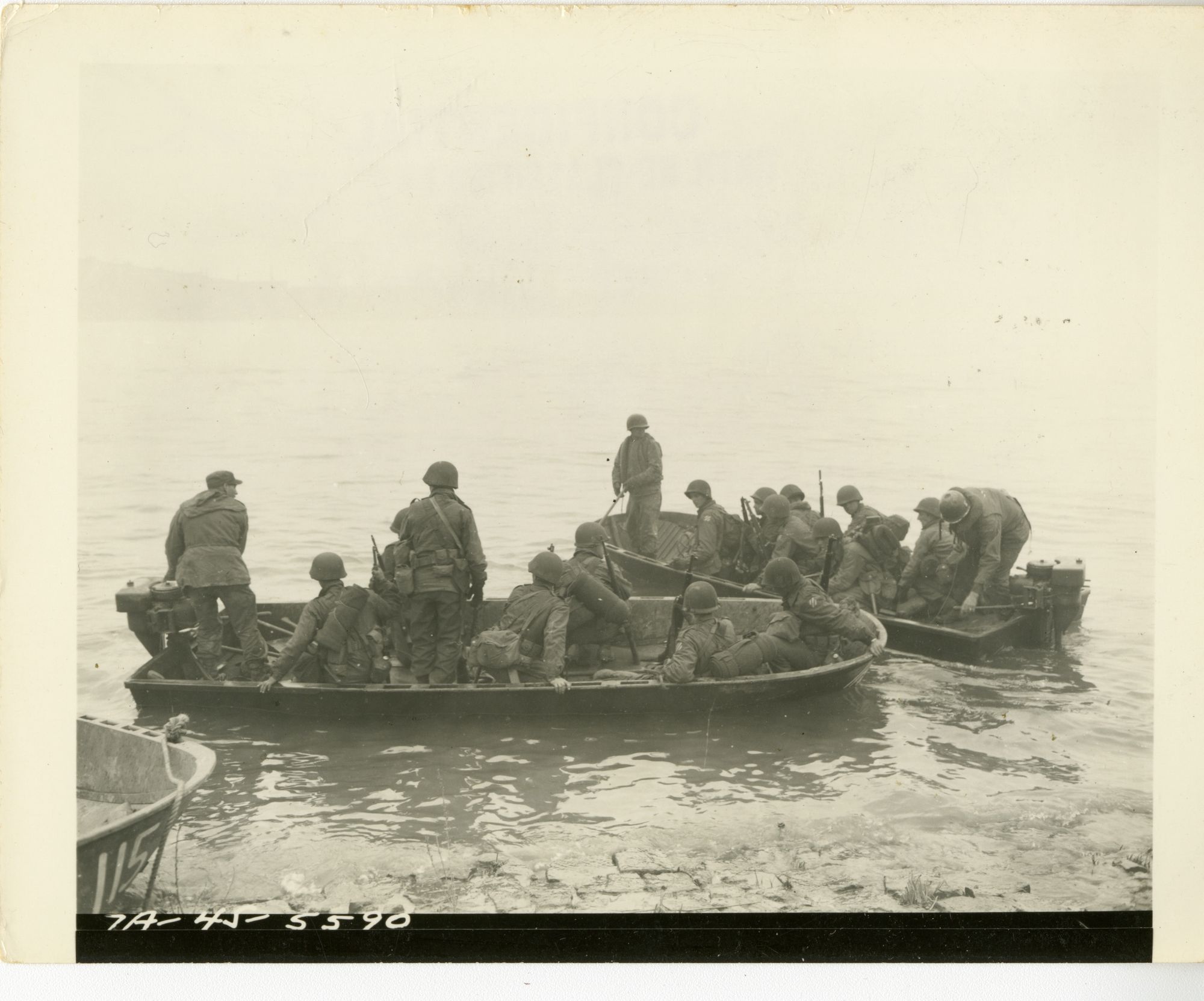
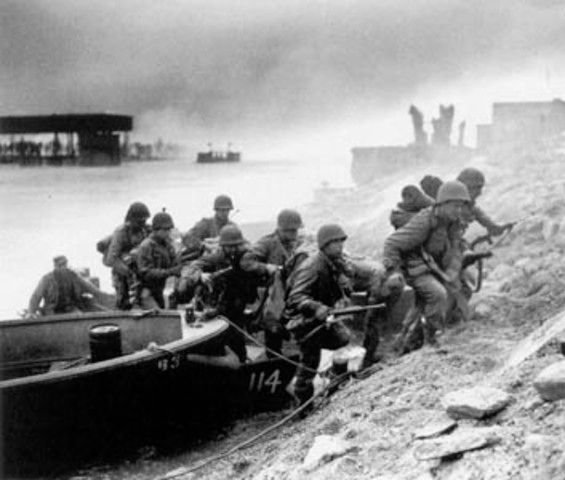
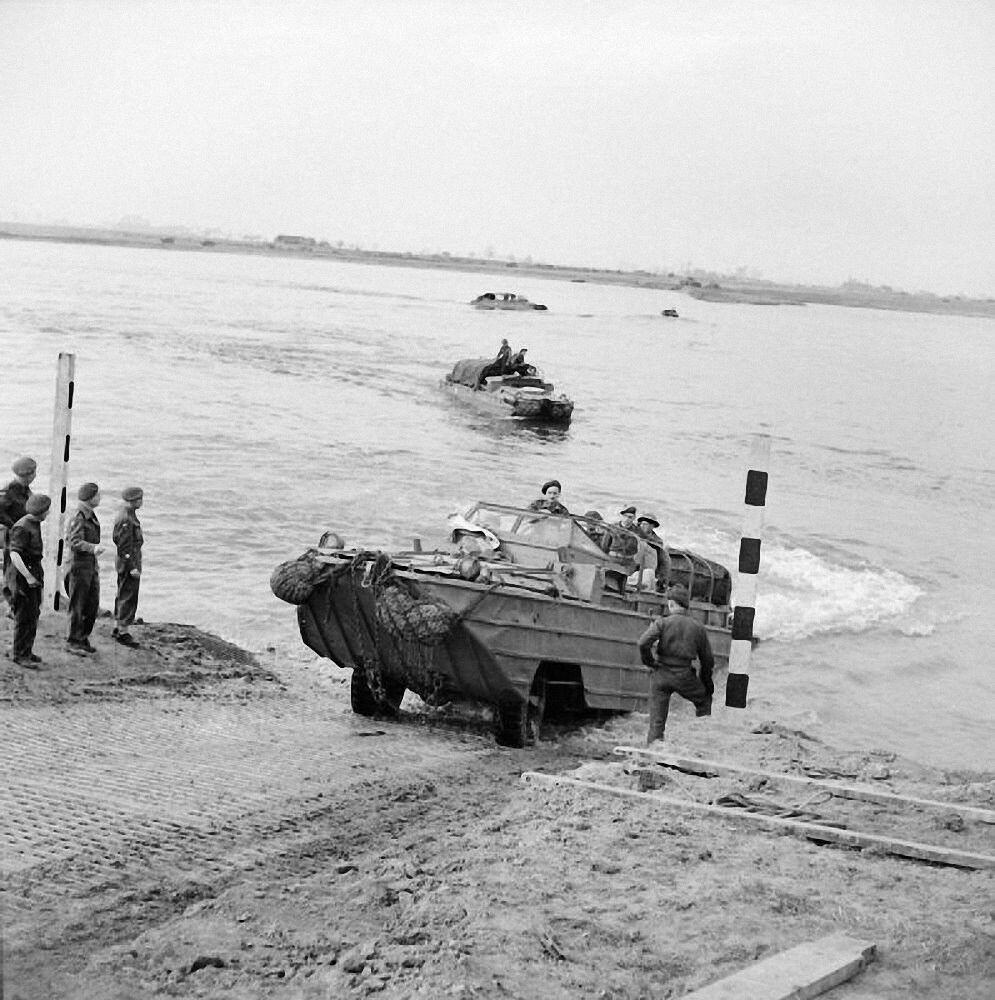
Another engineer unit relieved the 187th on March 27 and the battalion moved across the Rhine to Hirschfeld, near Dinslaken. Here, Charlie company built a timber trestle bridge across one of the many canals that led to the Rhine. The bridge was named after Lt. Tumas, who had been wounded on the Rhine crossing.

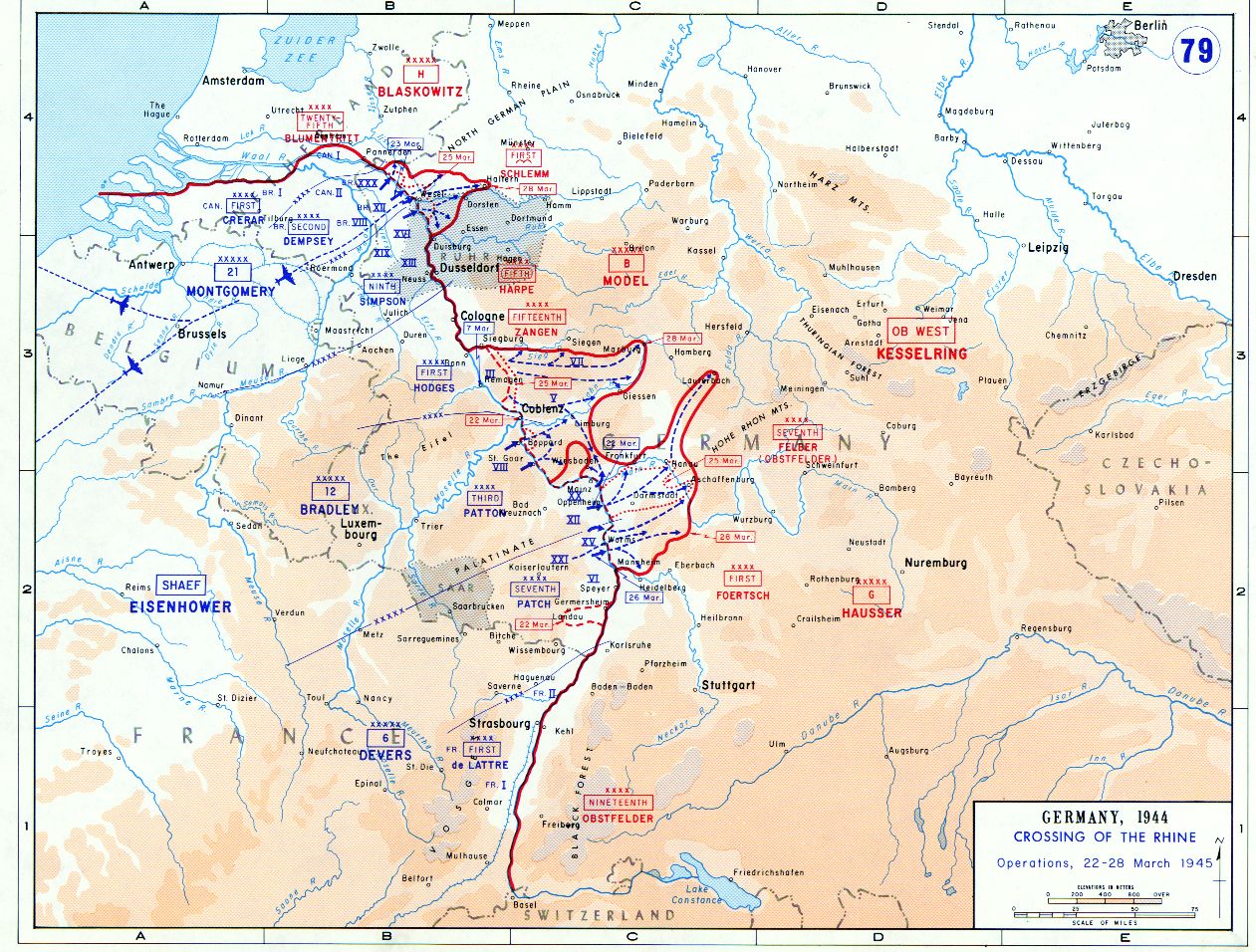
The other companies were engaged in road maintenance in the area for the next week. On April 6th, the battalion moved suddenly to Bottrop, about 15 miles further east for another assault operation in support of the 79th Division, across the Rhine-Herne and Horst canals.
This operation came up so suddenly that there could be no thorough planning or reconnaissance. The infantry stormed the canals with very few casualties, but by-passed pockets of enemy resistance and 88 MM fire from very close range slowed down bridge construction so that it took 30 hours for two bridges to be built across the parallel canals.
Able company built a Bailey bridge, named after Sgt. Mason who was seriously wounded in the operation, while Charlie company built a Treadway bridge across the second canal. Baker company suffered the most casualties, working under direct fire from a hidden "88".
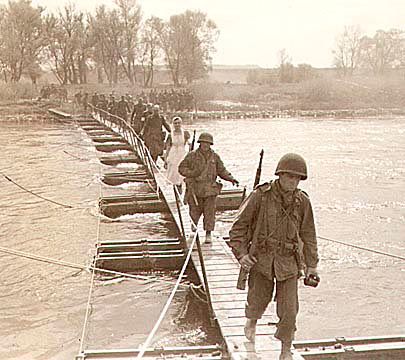
The battalion maintained the bridges and approaches for the next week, until April 14th, when movement orders were received and the 187th departed for Ascheberg, Germany, a small town south of Munster. Here, the war seemed far away. The town itself was untouched and the fighting had moved east so rapidly that the battalion found itself about 100 miles from the nearest German Troops.
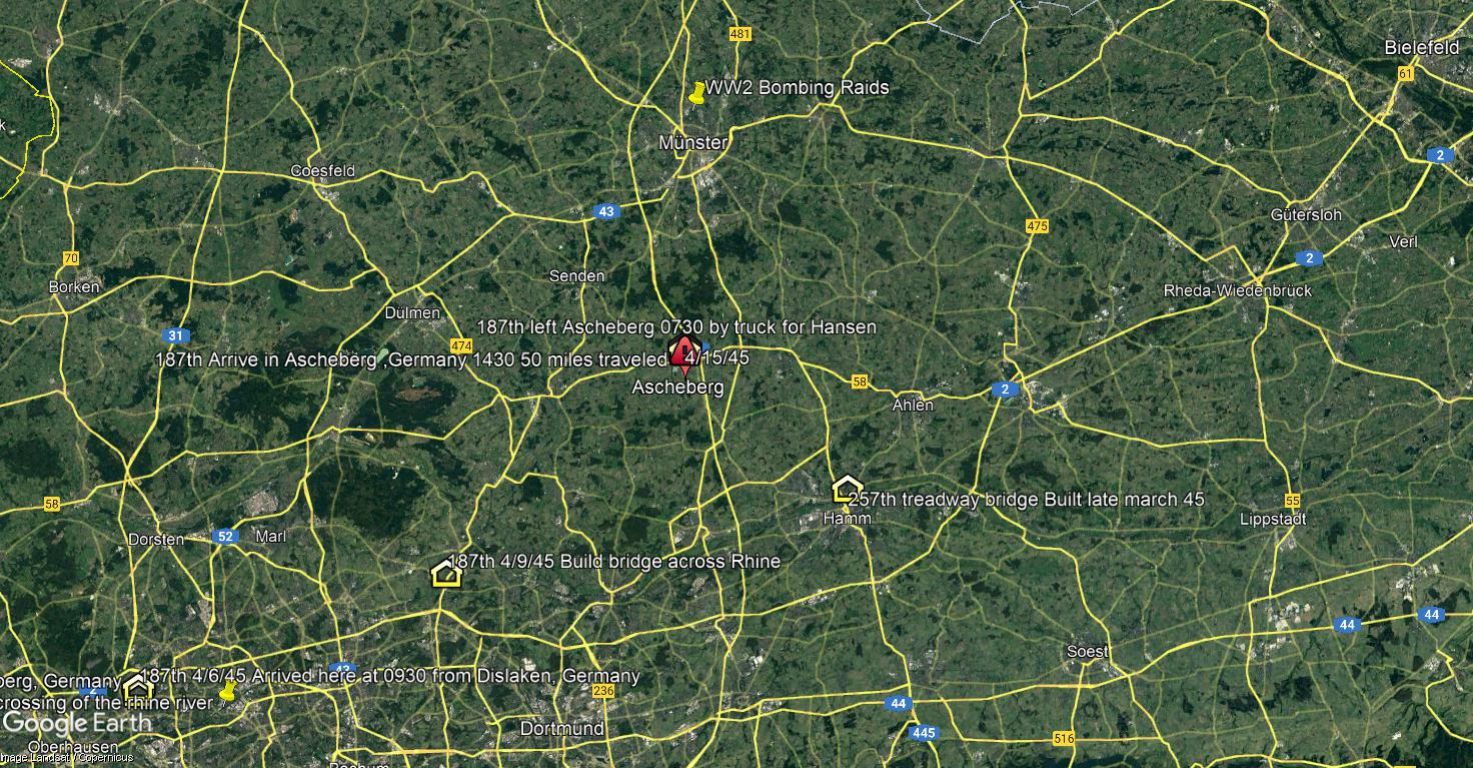
Work was not so strenuous. A few main supply routes were patched and maintained. There was time for athletics and passes to Paris and England. The first draft of a script for a battalion show was written at Ascheberg and the first research for this history was done there. Volleyball and softball leagues were formed. But all this lasted for two weeks and on April 28th, the battalion was assigned to the XXIII Airborne Corps for an assault crossing of the Elbe River.
An all-day motor convoy along one of Germany's famous autobahns brought the battalion CP to the little town of Hamerstorf.
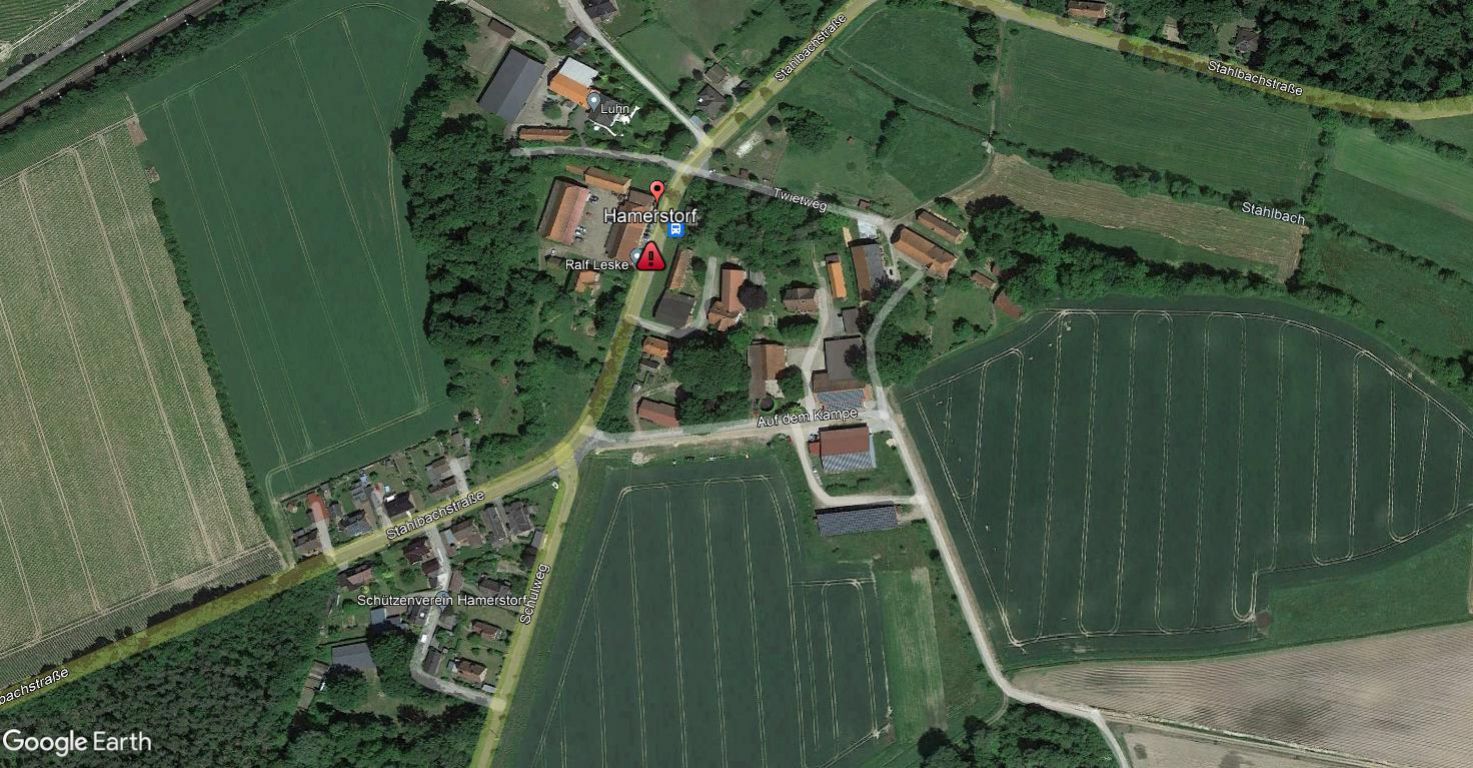
The line companies were located in tiny farming villages nearby.
The crossing of the Elbe proved easier than anybody had expected. The battalion supplied only 15 operators for storm boats and the crossings were made by the Infantry Division without casualty to any men of the 187th.
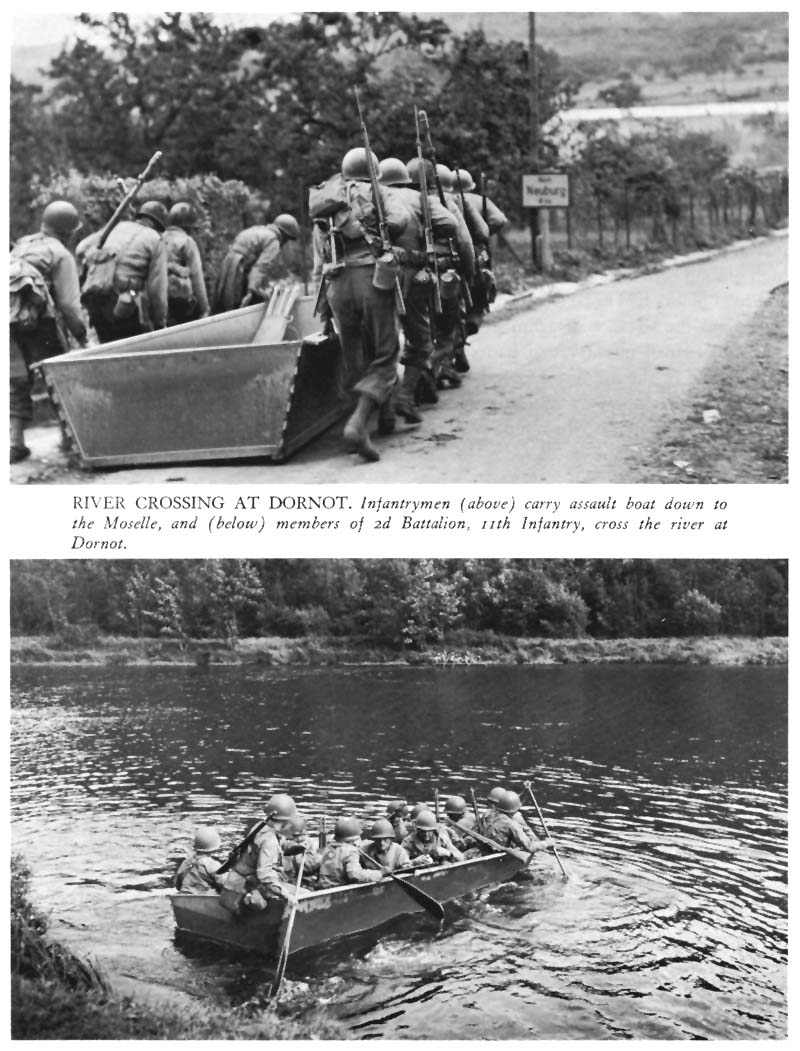
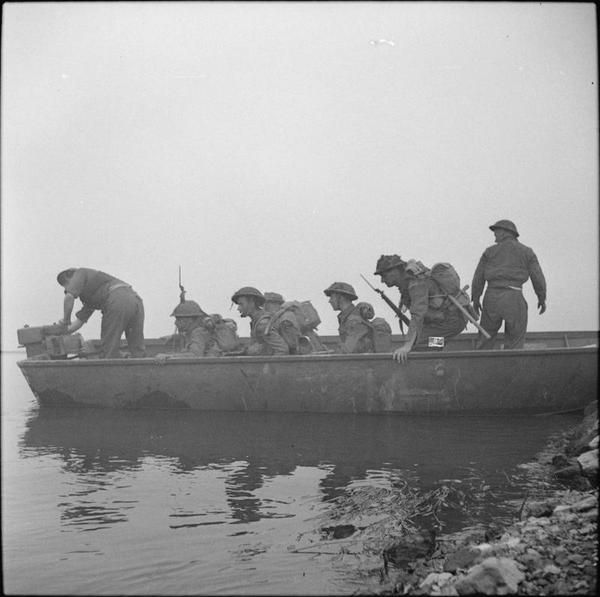
The Americans deployed two types of assault boats. The "storm boat" was an 8 man (6+2 crew) hi-speed Assault Boat with a 55 HP Outboard Motor, designed to the beach at speed, thus allowing the soldiers on board to "storm the shore". The M2 was a ten-man boat (8+2 crew) that was paddled.
On May 2nd, the battalion moved across the Elbe River and established a CP for one night at New Gulze. The 8th Division was pushing ahead so rapidly that another move was made the following day, to Gammelin, about 40 miles from the Baltic Sea.
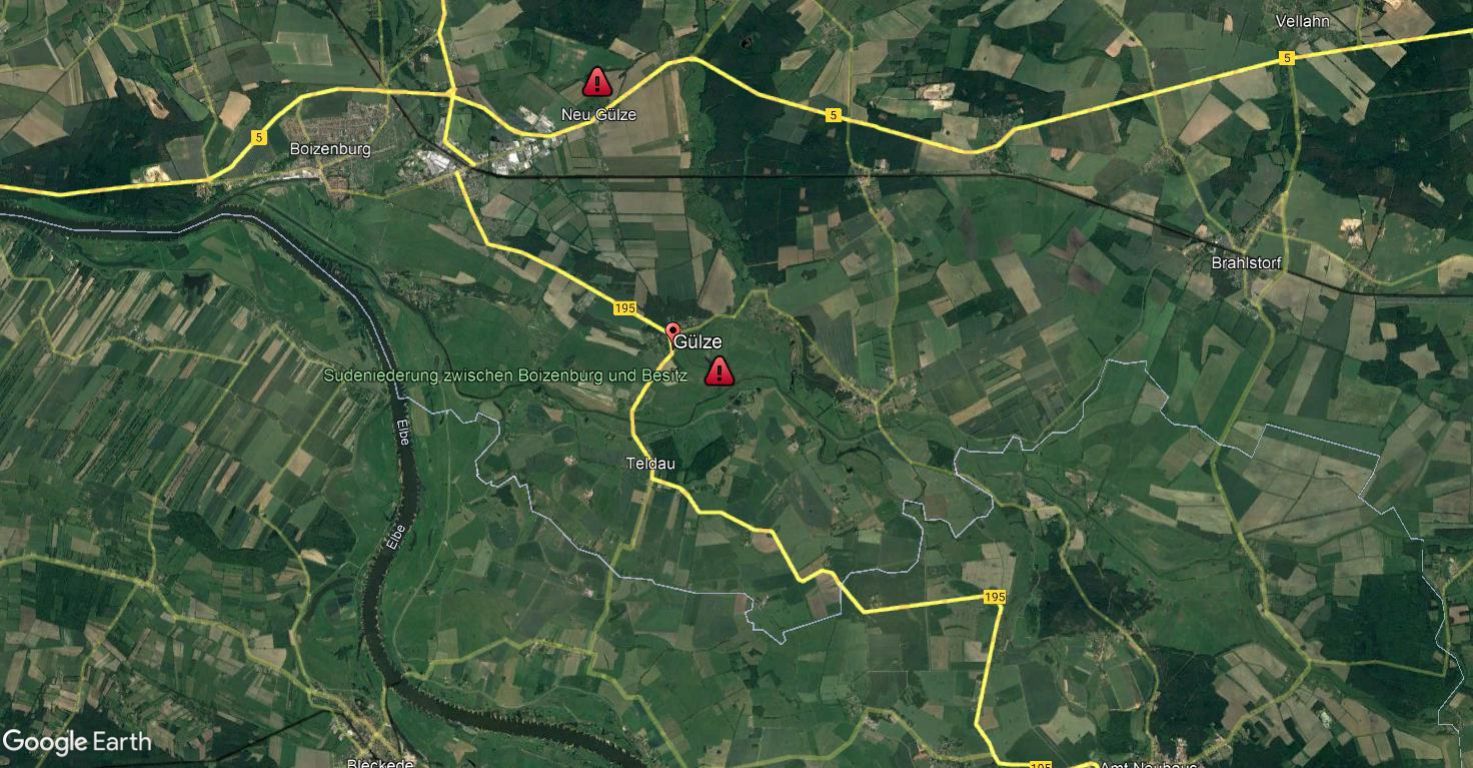
Charlie Company was located here too, with the CP. Able company moved to Hagenow, about six miles away while Baker company moved into a large estate in a tiny town nearby.
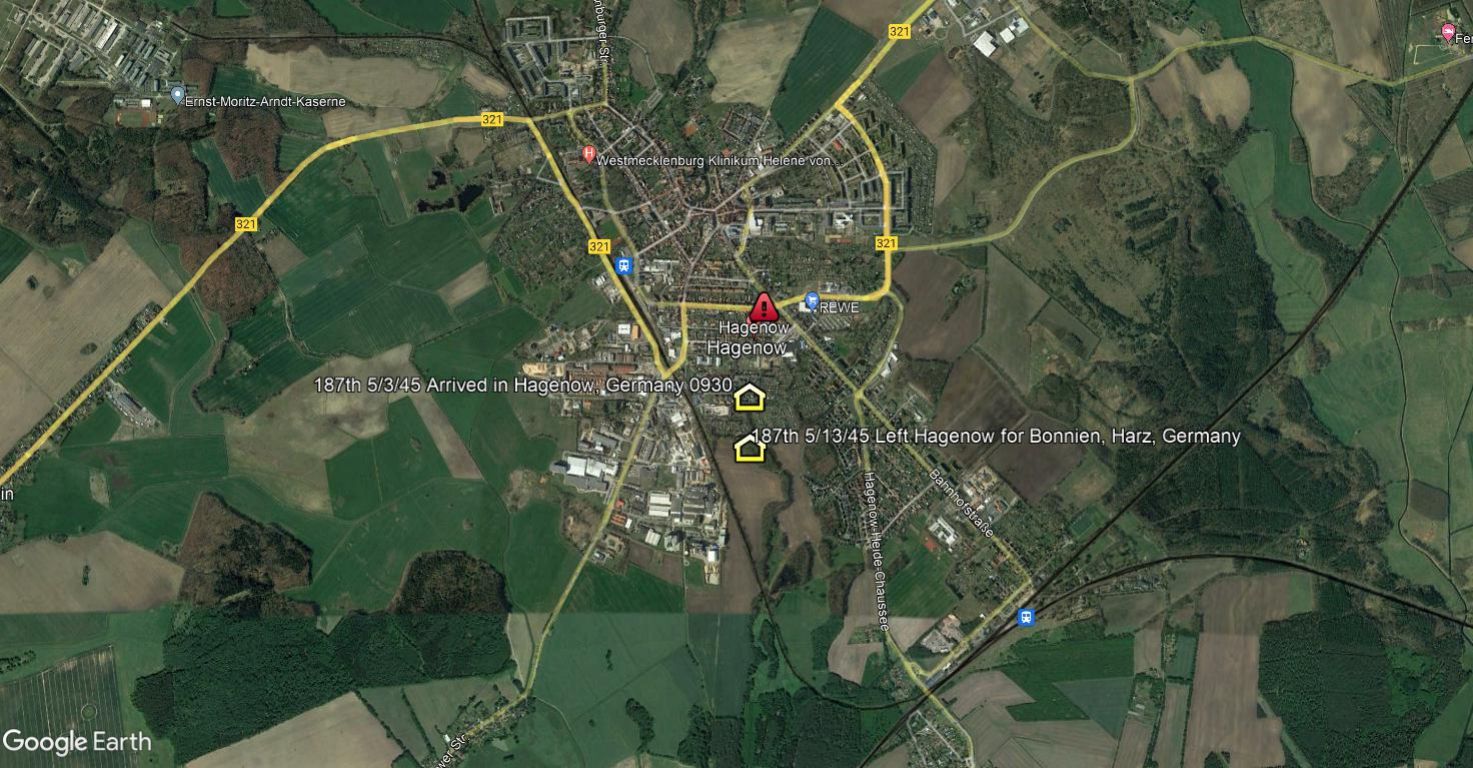
Advance parties in those hectic days often started looking for billets in towns before they were taken, so demoralized were the Nazis.
Note from me. The 187th was exposed to the death camps. My father told me of dead bodies piled up on top of each other. Army personnel was assisting the ones who were alive, but there were so many that were too far gone to survive and there was nothing that could be done to save them. This was a really angry part of the war for these men because they could not understand how someone could treat people like this.
For the first five or six days of May, movement of any kind on the highways was at a snail's pace as thousands of Germans with their vehicles and supplies moved into American lines to Surrender. Thousands more, pushed back by the Russians, less than 50 miles away, chose to surrender to U.S. Forces. There weren't enough troops to handle all the surrendering Germans, so they were kept moving to the rear where they finally were collected and placed in large Camps.
Ps. It was estimated that the Germans had five hundred detention camps, the latest number is around twenty-five hundred. The Germans estimated at the beginning of the war that they would kill Eleven million! Just think about that number!
Victory in Europe came to the 187th several days before it was officially proclaimed. The battalion's mission at this time was road maintenance, which meant pushing German vehicles into ditches when they stalled or ran out of gas.
Note from me. When the 187th reached Gammelin, Germany, they were headed to Berlin for more fighting. The Generals decided to let the Russians take Berlin, which upset a lot of American Troops to no End!
V-E celebrations were completely sobered on the night of May 7 when Capt. Tabor was shot and instantly killed by a drink-crazed man in Charlie's company.
Capt. Deyo was transferred from H&S company, which he had commanded since the preceding September, to Charlie company. Capt. Allotta, who had just joined the battalion from the 1130th Group was assigned as H&S company commander. Two other officers, Lt. Chamberlin and Orr had also joined the 187th and were assigned to Able Company. Soon afterward, Capt. Daniel transferred to the 368th General Services Regiment. He was replaced by Capt. Beavers, of that organization. Lt. Parish was made liaison officer while Capt. Beavers assumed command of Baker company. In mid-June, Capt. Berger was assigned to the battalion staff from the 1130th Group.
On May 13th, the CP was moved to Bockenem, Germany. The line companies were billeted in surrounding towns, Able in Bonnien, Baker in Hary, and Charlie in Volkersheim. There, the battalion was attached to the 2nd Armored Division whose mission was to prepare for the occupation of Berlin.
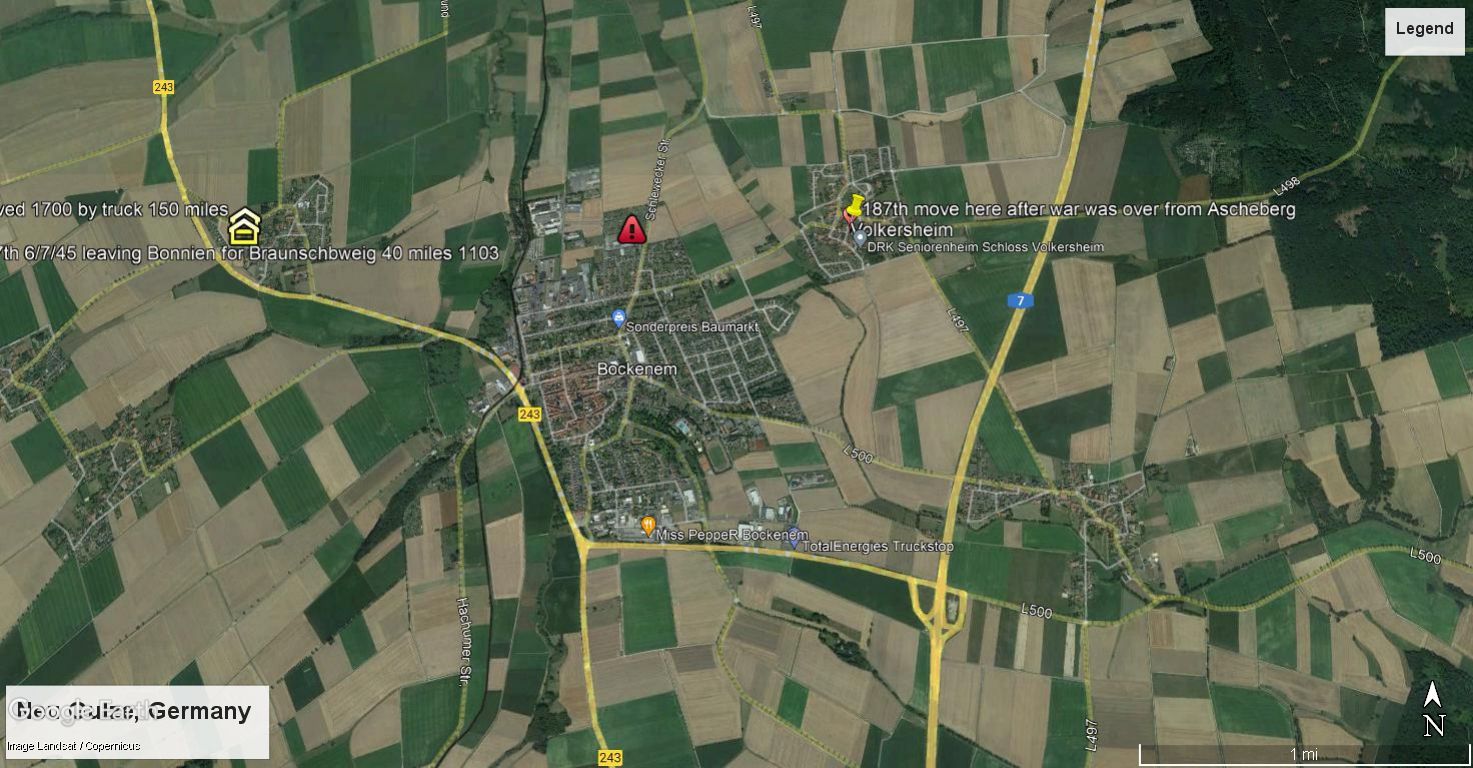
For the next three weeks, the 187th primped and polished, cleaned up and painted its vehicles, inspected its men, issued them new clothing, and brushed up its garrison manners. Close-order drills and more of the same became the order of the day until the battalion became a perfect garrison organization.
On Decoration Day, a parade and memorial service were held in Bockenem to honor the memory of the battalion's dead. Awards were presented to the heroes of the battalion by the Group Commander, Colonel Green.
The next move was to a large Airfield outside of Braunschweig, Germany, on June 7th. There, more men were sent on to Paris, the Riviera, England, and to rest camps in France and Holland. Garrison life, in former Luftwaffe quarters, became easier as more and more time was given over to recreation. Preparations for the Berlin occupation continued, however.
Note from me. At this time in the war, Army personnel are being evaluated for possible transfer to the Japanese theater. Also, a lot of men did not get time off during the war, so the Army is allowing some downtime before they are sent back home. The Army uses a point system to pick and choose which men go home first. Wounded go automatically.
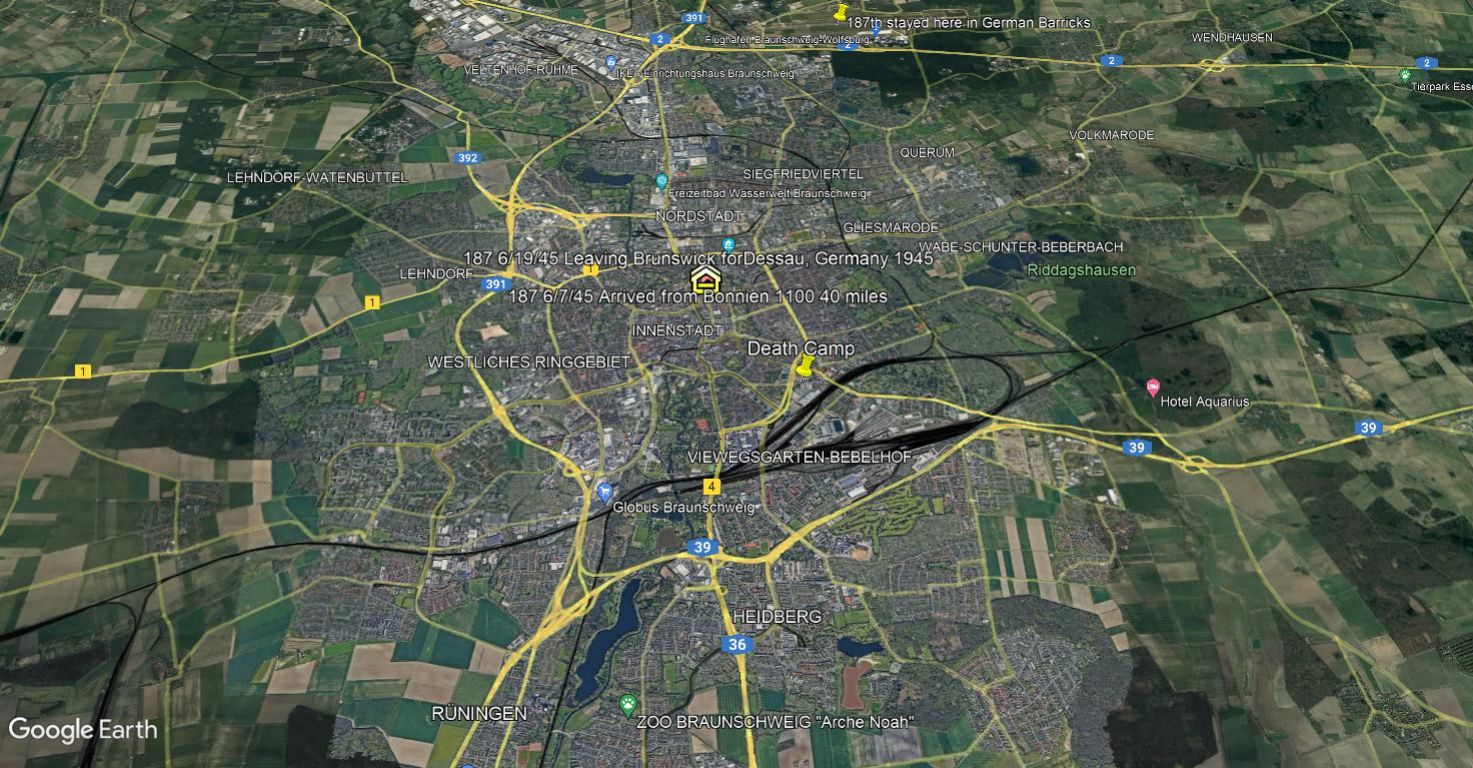
Note from me. Look for the yellow pin on the map. I believe this is where the 187th got a first-hand look at a Death Camp.
Another long move brought the battalion to the junction of the Elbe and Mulde rivers, the boundary between the Russian and U.S. forces at Dessau. Here, there was no work to do and plenty of good beer to drink. The battalion was billeted in apartment houses and for the first time, the men experienced most of the comforts of a civilian existence in the Army.
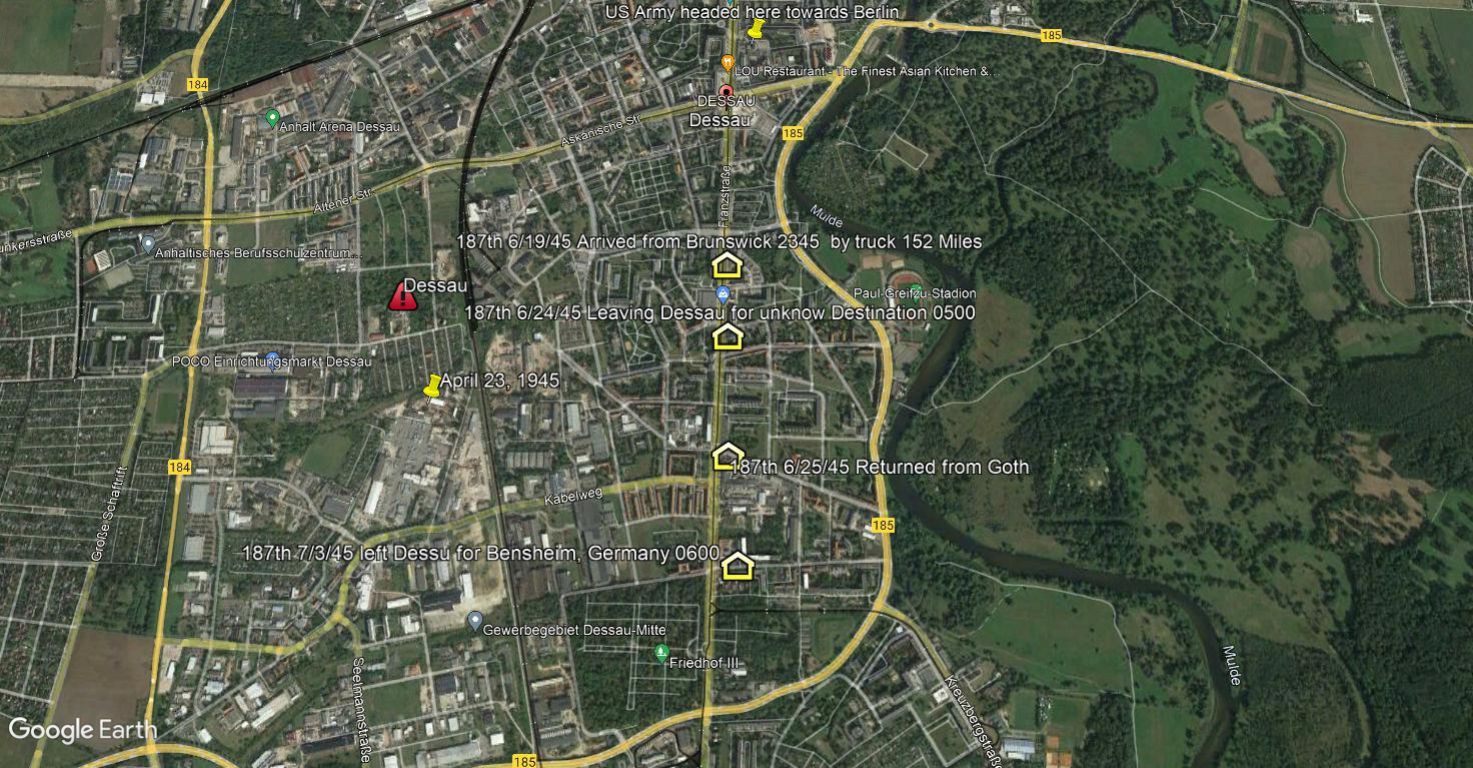
The battalion's assignment to Berlin District suddenly ended and on June 24th, a long motor march down the autobahn brought the 187th to a bivouac area outside of Gotha, on the way to a temporary staging area organized by VI Corps just outside of Bensheim. At Gotha, orders were received to return to Dessau and the 187th settled down again for another week to enjoy the fruits of a vacation.
All other U.S. forces were moving out of Dessau, either into Berlin or to the West, toward U.S. occupied territory. The Russian occupation area extended 100 miles West of Dessau and before that week was ended, Red Army troops had completely enveloped the 187th. Just when it began to appear that the unit was to become another " Lost Battalion," movement orders arrived. Again the battalion set off down the long, straight autobahn to Alsbach, just north of Bensheim.
Note from me. This was a 320-mile road trip to Alsbach from Dessau.
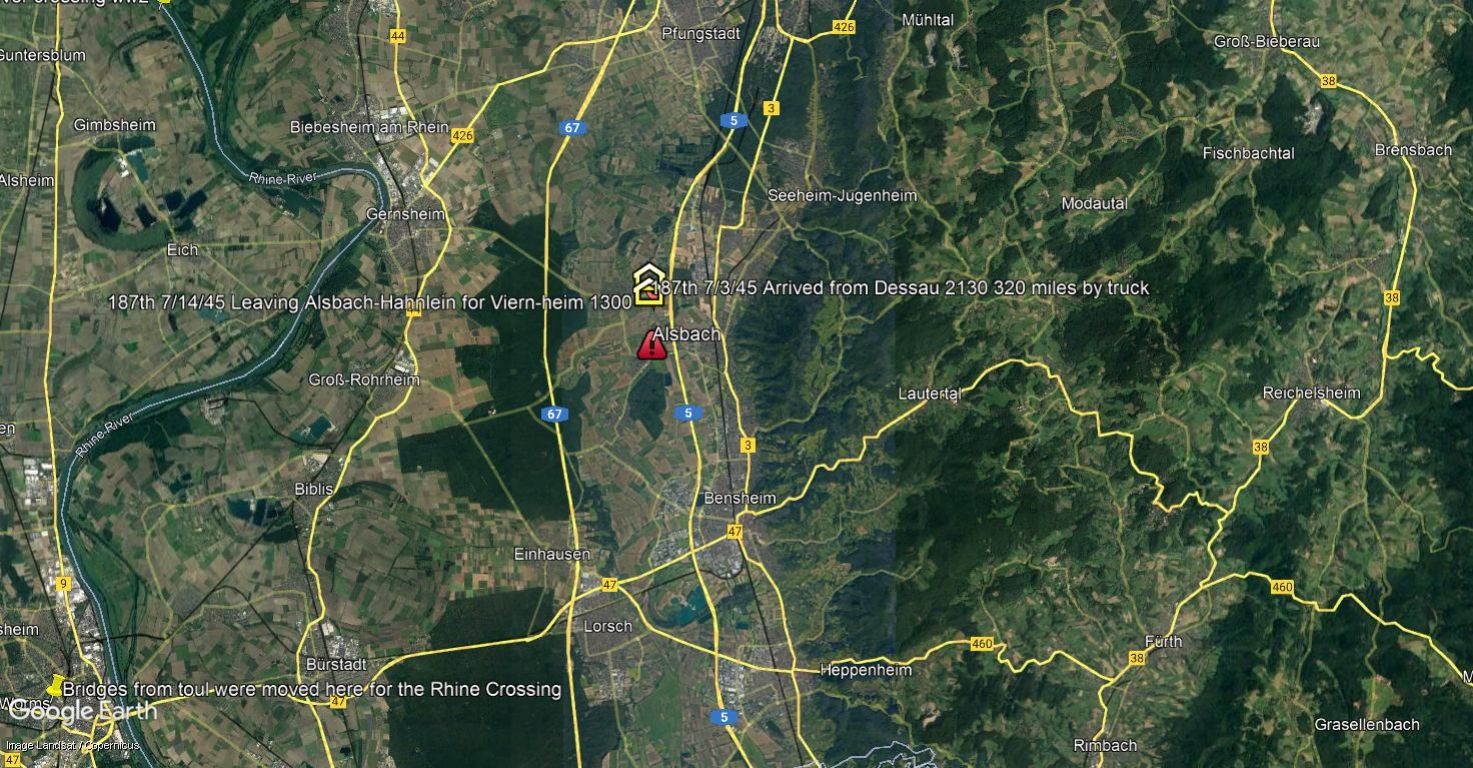
A bivouac area was set up in a grove of trees and the battalion settled down to camp life in pup tents, waiting anxiously for the orders which were to send it home for a short while before moving to the Pacific War. Finally, orders did come, but they assigned the battalion to 1120th Group, XXI corps of Seventh Army, and re-established an operational status for the 187th. On July 14th, the battalion moved to Viernheim town 10 miles from Mannheim. Engineer reconnaissance and bridgework were begun immediately.

The evenings of July 13 and 14 found the battalion assembled at the music hall in Seckenhelm for the opening of the 187th musical comedy. All in Fun. This was the same show that had its beginning in April in Ascheberg. During all that time, the cast was rehearsing whenever and wherever it could, building sets and making costumes. The show was such a success that Seventh Army special service took it over and put it on tour.
Note from me. No, it wasn't. The Army dropped it. At this time, Bob Hope and company showed up to entertain the troops, some of the men got to see him and some didn't due to other reasons.
The next two months were to see a lot of personnel changes in the 187th. All of the original cadres from Alabama were transferred out by the middle of August for shipment home and discharge. High point officers, Major Bolon, Capt. McAnally, Lts. Coker and Bohnet, left in July.
Capts. Witt, Beavers, and Lt. Parrish were transferred to reinforcement depots for direct shipment to the Pacific. All three had volunteered, Capt. Baker followed them within a week.
On July 29, Col. Pearce was relieved of command of the battalion and assigned to a depot for shipment to the Pacific. Lt. Col. Vincent C. Frisby, of the 1257th Engr's. then joined as the new commander.
Jobs changed rapidly. Lt. Bobolia assumed command of Able Company, Lt. Knox of Baker and Lt. Abney of H&S. Lt. Epstein was made adjutant and Major Holmgren became an executive officer. Capt. Matheu, who transferred in with Col. Frisby, became S--3, Capt. Aliotta was transferred to the Seventh engineer section.
Meanwhile, enlisted personnel was turning over rapidly. High point men continued to leave and their places were taken by low point men from other units.
Finally, the end came. Another piece of paper ordered that all personnel but one officer and the four company clerks, be transferred out of the 187th. This began on September 8th. By the 12th it was all over. More than 600 men and officers left the battalion in those four days. The officer, Lt. Zinkeler, and the four company clerks settled down with the records to await the fate of the battalion, eventual inactivati0n. This was to come before November 30th.
Men and officers with high point scores were transferred to units going to the states. Others were sent to occupational units, still, others were sent to units whose status was unknown.
Thus was ended the Story of the 187th, a story which began in the agate desert of Oregon in October 1943 and ended in the Rhine valley in conquered Germany in September 1945.
It's a story that may not join more important or illustrious narratives in War Department annals, but it is a story that will live in the heats of the men of the 187th Engineer Combat Battalion for all time.
TO BE CONTINUED
The stories of A, B, and C companies
Contact us at the187thengcobn@aol.com
You can sign up for more information at https://187th-engineering-combat-battalion.ghost.io/ghost/#/site
If you are a WWII vet or a family member and wish to include your history or the history of a loved one, I'd love to hear from you. My main emphasis is to acquire the history of the men who served.
YOU CAN CATCH UP ON THE JOURNEY OF THE 187TH BY SEARCHING FOR THESE PAST POSTINGS ON THE INTERNET.
FOR EXAMPLE
187TH ENGINEER COMBAT BATTALION "TITLE OF STORY" LET'S SAY "CAMP WHITE."
These articles are listed from newest to oldest.
RHINELAND
CENTRAL EUROPE
ARDENNES-ALSACE
PASSENGER LIST
STORY OF WILLIAM R. MARTIN
CAMP WHITE: OREGON GOES TO WAR
187TH ENGINEER COMBAT BATTALION PHOTO
US 9TH ARMY
CHARLIE COMPANY
BAKER COMPANY
ABLE COMPANY
SUDDENLY THE MOVE
THE STORY OF THE 187TH ENGINEER COMBAT BATTALION: THE NEXT DAY
THE STORY OF THE 187TH ENGINEER COMBAT BATTALION: IN THE BEGINNING
CAMP WHITE OREGON
Note. You can access past postings by clicking on the HOME icon or picture in the upper left-hand corner of the page. It will take you to the home page where you can view past Articles.
